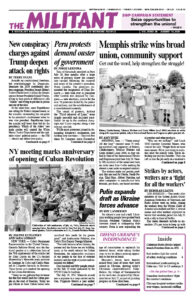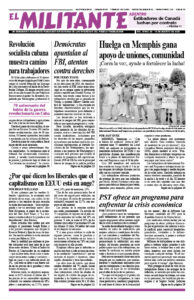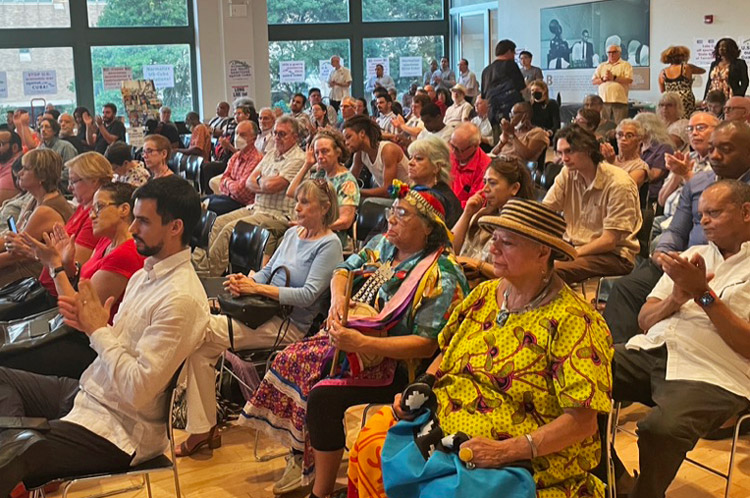NEW YORK — Cuba’s Permanent Representative to the United Nations, Gerardo Peñalver Portal, was the featured speaker at a celebration here of the 70th anniversary of the attacks led by Fidel Castro on the U.S.-backed dictatorship’s Moncada army garrison in Santiago de Cuba and Carlos Manuel de Céspedes barracks in Bayamo. Those heroic acts marked the opening of the Cuban Revolution.
“Today we are gathered here to honor the feat that would lead the Cuban people on the road of freedom. Today we pay tribute to those Cuban heroes who sacrificed their youth for the greater good,” said Ambassador Peñalver, also Cuba’s First Deputy Foreign Minister.
“Precisely because of our history, the present and the future we are building, many in the world admire the Cuban Revolution, the indomitable resistance of our people in the face of external hostility, and the work of justice and humanism we defend.”
One hundred and fifty people attended the July 29 event sponsored by the NY/NJ Cuba Sí Coalition.
The July 26, 1953, Moncada assault was a response to a coup carried out by Gen. Fulgencio Batista a year earlier. The 160 combatants didn’t succeed in capturing the garrisons. Five died in battle, 56 were captured and murdered in cold blood, and 32 imprisoned. But these actions reverberated politically across Cuba.
Castro and other survivors were put on trial and given terms up to 15 years. In prison the Cuban leader reconstructed his testimony on scraps of paper. Smuggled out in match boxes and published clandestinely as “History Will Absolve Me,” they became the program of the revolutionary movement. Tens of thousands were distributed across the island as part of a defense campaign that won the fighters’ freedom in 1955.
That program wasn’t just words. Having renewed the revolutionary struggle a year later, the July 26 Movement and Rebel Army began carrying it out in liberated areas even before Batista fled on Jan. 1, 1959.
Ike Nahem, a leader of the Cuba Sí Coalition, welcomed a delegation from Cuba’s U.N. Mission and thanked the Malcolm X and Dr. Betty Shabazz Memorial and Educational Center for hosting the event. The center is located in what had been a section of the old Audubon Ballroom where revolutionary leader Malcolm X was assassinated in 1965.
Nancy Cabrero from Casa de las Américas, and Andreia Vizeu, host of WBAI’s Voices of Resistance, co-chaired the event.
Steve Clark, editorial director of Pathfinder Press and a leader of the Socialist Workers Party, introduced Ambassador Peñalver.
Workers and peasants in power
“The Cuban Revolution is a revolution that lives and fights to this day. A revolution that brought the workers and peasants to power,” Clark said. “The Cuban people have shown time and again they will defend their sovereignty and independence — their socialist revolution — against the world’s most brutal empire, and what will be the world’s final empire.”
The Cuban Revolution, Clark said, “was a pledge not just to the Cuban people but to those the world over,” including right here in the U.S., “of the kind of revolution and the kind of working-class organization and leadership we must build.”
“The U.S. rulers’ aim under every Democratic and Republican president has been to crush the Cuban people, to overturn their revolution and to snuff out their revolutionary moral and political example. But they have not succeeded — and they will not! That too was the message of Moncada,” Clark said, introducing the ambassador.
“Today more than ever,” Peñalver said, “the solidarity we are receiving from you takes on special significance, because Cuba is under heavy siege.” He pointed to Washington’s more than 60 years of hostile economic, trade, and financial measures as “the central element that defines the policy of the United States towards Cuba.”
The U.S. government’s insistence on keeping Cuba on its State Sponsors of Terrorism list is “extremely harmful,” he said. “It reinforces the blockade against Cuba.”
On human rights, the ambassador said, “the U.S. government has no moral authority whatsoever to question Cuba and has little or nothing to teach due to its own dismal record.”
Cuba offers solidarity
“It should not be forgotten that the U.S. government used the COVID-19 pandemic as an ally in its efforts to increase the siege against Cuba,” Peñalver said. It blocked “access to basic medical supplies, such as oxygen.”
Despite this, he said, “we were able to offer the world the solidarity that Washington did not give to the Cuban people, with our medical brigades, in the worst moments of the pandemic.
“Even in the midst of the inhuman limitations imposed by the blockade, Cuba will never renounce its socialist system of social justice,” said Ambassador Peñalver. “We remain committed to those young people of the Centennial Generation to not disappoint their legacy and to defend the dignity of our homeland. Cuba will not give up, and we will continue to resist and overcome.”
Speaking for the Puerto Rican Nationalist Party in New York, Alegna Cruz said their “support and solidarity with Cuba is a living principle that unites us through history” and is part of the fight for independence of the U.S. colony. “Our sister nation Cuba is still setting an example” of courage and sacrifice.
Other speakers were Zayid Muhammad of the People’s Organization for Progress in Newark, New Jersey; Juanita Millal from the Mapuche people in Chile; and Calla Walsh, a co-chair of the National Network on Cuba.
Erin Feely reported on the Cuba Sí Coalition’s work in winning passage by the New York City Council of a resolution calling for the U.S. government to end its economic measures and travel restrictions against Cuba, and to remove Cuba from the State Department’s list of state sponsors of terrorism. Vincent Verdree, December 12th Movement; Molly Moser, Democratic Socialists of America; and Jacob Buckner, Young Communist League, also spoke about this effort.
Dinner and dessert, along with specially prepared Cuban drinks, added to the celebratory nature of the event. A raffle of two paintings of Puerto Rican independence leader Pedro Albizu Campos helped offset costs.



